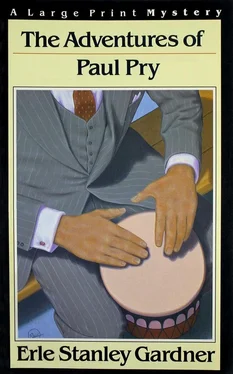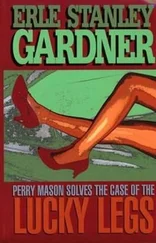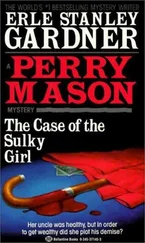“Wonderful!” exclaimed Paul Pry with enthusiasm. “You may call me Paul.”
“And we’re old friends, Paul, meeting for the first time after an absence of years?”
“Yes,” he said, “but don’t make the absence too long. It doesn’t sound plausible. Having once known you, a man would never permit too great an interval of separation.”
She laughed lightly. “And so you believe in fate?” she asked.
Paul Pry nodded, his lips smiling but his eyes watchful.
“Perhaps,” she said, “it was, after all, fate.” She sighed, and for the first time since she had sat at his table, lowered her eyes.
“What is fate?” asked Paul Pry.
“The fact that I should meet you just when I needed someone...” Her voice trailed off into silence and she shook her head vehemently.
“No,” she said decisively, “I mustn’t go into that.”
The orchestra struck up a rollicking one-step. The blue eyes once more impacted full upon his face.
“And do we dance, Paul?” she asked.
He nodded and rose, taking the back of her chair in his hand, moving it away from the table as she swung up, in front of him, her arms open, her lips smiling invitingly.
They moved out onto the floor, a couple well calculated to catch the eye of any connoisseur of the dance. Paul Pry, moving as gracefully and lightly as though his feet had been floating on air just above the floor, the girl well curved but willowy, straight limbed and radiating a consciousness of her sex.
“Do you know,” she said, “that I was contemplating suicide earlier in the evening?”
Paul Pry tightened his arms in a gesture of protection. “You’re joking,” he exclaimed.
“No,” she said. “It’s a fact.”
“Would you care to tell me about it?” he asked.
“I think,” she said slowly, “I would.”
They danced for a few moments in silence and in some subtle way she managed to convey the impression that she had thrown herself entirely upon his masculine strength as a bulwark of protection. “But,” she added after the interval of silence, “I couldn’t tell you here.”
“Where?” he asked.
“I have an apartment,” she said, “if you care to come there.”
“Splendid,” Paul Pry said enthusiastically.
“Let’s go then,” she told him. “I was here only for the excitement. Only to get my mind away from myself. Now you’ve given me just the stimulus that I need to restore my perspective.”
The music stopped.
She gave just the faintest hint of pressing her body close to his and then managed to forestall the intimacy of the moment and become, once more, respectably distant, standing with her hand on his arm, her frank blue eyes smiling into his.
“A wonderful dance,” he said applauding.
“You dance divinely,” she breathed.
There was no encore. She gently exerted pressure on his arm.
“Would you care to leave now?” she asked.
“Yes, indeed,” he told her.
Paul Pry lived by his wits and he was an opportunist. Moreover, he was, as Mugs Magoo so frequently pointed out, entirely without prudence. Paul Pry would walk into any danger which offered a reasonable amount of excitement, and do it with the utmost sangfroid , trusting to his ingenuity to extricate himself from any untoward complications.
Paul Pry, upon this occasion, took only a reasonable amount of precaution to ascertain that he was not being shadowed as he left the cabaret. Having satisfied himself that no one was on his trail, he handed the young woman into a taxicab, followed her, and was lighting a cigarette as the cab driver slammed the door and nodded his comprehension of the address the young woman had given him.
It was but a short ride to the apartment and Paul Pry followed docilely into the elevator, out of the car again, and down a corridor. A close observer would have noticed that his right hand hovered near the left lapel of his coat as the young woman opened the door of the apartment and switched on the lights. But a moment later his hand was back at his side, for the apartment was, quite apparently, empty, unless someone were concealed behind a closed door. And Paul Pry always claimed that he could get a gun from its holster long before a person could twist the knob of a door, open it and draw a bead.
“My God, Paul,” she said, “I’m glad that I met you!”
Paul Pry watched the outer door of the apartment move slowly shut until the spring lock automatically clicked into position and then smiled at her. “It was,” he said, “a real pleasure to me, Stella.”
“And,” she said, smiling at him with half-parted lips and steady eyes, “we’re old friends. Wasn’t that the understanding, Paul?”
“Yes, Stella.”
“Very well then,” she said, “I’m going to get out of these clothes and get into something comfortable. Wait here and make yourself at home.”
Paul Pry’s hand once more hovered about the lapel of his coat as she opened the door of the connecting bedroom, but the door closed without event and Paul Pry moved to a chair which gave him a commanding position, sat down, crossed his knees and lit a cigarette.
Five minutes later the bedroom door opened and Stella came out, a vision of filmy loveliness. And it may or may not have been accident that she had placed a very bright light directly behind her, that she stood for a long moment in the doorway of the bedroom before switching out the light, and that the brilliant illumination transformed her silken coverings into a mere filmy aura which served to frame, without concealing, her every curve.
She switched out the light and came to him.
She perched on the arm of his chair; her fingers smoothed his hair; one leg swinging free in a pendulum-like arc, swung clear of the filmy silken covering.
“Paul,” she said, “really and truly I feel as though I’ve known you all my life.”
“Go ahead then,” he said, “and confide in me.”
She sighed and her hands dropped from his hair, brushed lightly along his cheek and then came to rest on his shoulders.
“Paul,” she said, “don’t look at me while I tell you. I can’t bear that. Sit just as you are and listen.”
“Listening,” he told her.
“Did you ever hear of a man called ‘Silver’ Dawson?”
“No,” said Paul Pry. “Who is Silver Dawson?”
“The worst fiend unhung,” she said with vehemence.
“That still leaves a lot to my imagination,” Paul Pry reminded.
“He’s got the letters,” she told him.
“What letters?”
“The letters that I wrote to a man who betrayed my confidence.”
“Indeed?” said Paul Pry.
“Yes,” she said. “And you see I was married at the time.”
“Ah,” said Paul Pry in a tone of quickening interest, “and you’re married now?”
“No, my husband is dead.”
“I see,” he said, in a tone of one who waits for further revelations.
“But he left this peculiar will,” she said, “in which my inheritance was predicated upon my fidelity. The will contained a proviso that if it should appear I had been unfaithful to him during our married life, the inheritance was to go to a charitable institution.”
“I see,” said Paul Pry, “and the letters threaten to complicate things?”
“The letters,” she said, “would ruin me.”
“You shouldn’t have written them,” he told her.
She slid her palm under his chin, tilted his head so that her eyes could stare down into his. “Tell me,” she said, “did you ever do anything that you shouldn’t have done?”
“Lots of times,” he said.
“All right then. So have I.”
Paul Pry laughed and patted her hand.
“And,” she said meaningfully, “I intend to do other things that I shouldn’t do. It’s lots of fun. But I don’t like to lose an inheritance on account of an innocent affair.”
Читать дальше












